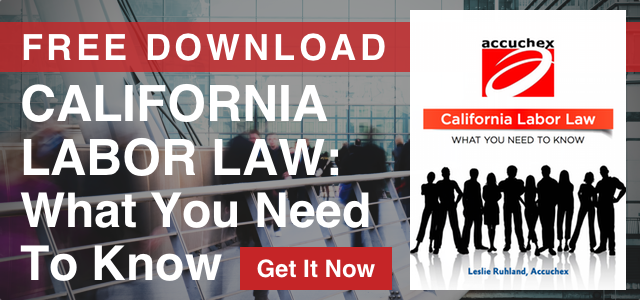Employers continually deal with compliance issues and, with California break laws, rest periods and meals make compliance that much more challenging.

The California labor employment law protects the rights of California employees and this includes many new laws since 2014 that also protect new immigrants. In addition to protecting meal and rest breaks, the California labor code covers issues such as overtime pay, tip pooling laws, vacation laws and more.
California Employee Break Laws and Lawsuits
Recently in Los Angeles, a former employee of Guess Retail Inc. filed a California labor lawsuit over missed meal breaks, lack of payment for the alleged missed meal breaks, as well as improper payment of wages upon termination. The lawsuit, Burgos v. Guess Retail Inc., is proposed as a class action suit, and it is the third lawsuit against Guess already in 2015.
According to the available court documents, the plaintiff Kriss Burgos was a non-exempt hourly employee at a Guess facility in California. She has alleged that she was required to work without being allowed rest periods or a meal break, and was never compensated for those missed breaks.
The California labor law requires employers to provide regular rest breaks and an uninterrupted 30-minute meal period to be taken while off-duty, after the fifth hour of duty.
California Labor Laws - Breaks Must be Provided for Piece-Rate Based Employees
There were a number of changes and additions to California labor law in 2015. Employer provision for meal and rest breaks was one of the more prominent changes.
Here is a detailed breakdown of the requirements embodied in Section 226.2 of the Labor Code:
Meal and Rest Breaks
Beginning on January 1, 2016, this law added to the existing state Labor Code. The new Section 226.2 makes it even more difficult for California employers to pay employees on a piece-rate basis for any part of their work.
- It requires employers to pay piece-rate employees for rest and recovery periods, and all periods of “other nonproductive time” separately from, and in addition to, their piece-rate pay.
- It makes wage statement compliance for piece-rate employers even more complex.
- As it does not contain a collective bargaining exemption, it also applies to employers of unionized employees.
Section 226.2 requires that employers pay employees for rest and recovery periods and “other nonproductive time” as follows:
Rest and Recovery Periods
Employers must pay piece-rate employees for rest and recovery periods at an hourly rate that is determined by dividing the employee’s total compensation for the workweek (excluding compensation for rest and recovery periods and overtime premiums) by the total hours worked during the workweek (not including rest and recovery periods).
The bill allows certain employers some additional time to program their payroll systems to comply with the “average hourly rate” requirement, provided that they retroactively pay employees the required amount.
Until April 30, 2016, certain large, newly acquired, or publicly-traded employers could pay employees the applicable minimum wage for rest and recovery periods, provided that they began paying employees based on the specified rate by April 30, 2016 and retroactively paid all affected employees the difference between minimum wage and the required average hourly rate (plus interest) by that date.
All other employers had to modify their payroll systems to comply with the new requirements as of January 1, 2016.
Meal and Rest Break Obligations of Employers In California
Employees cannot work more than five hours without providing an unpaid, off-duty meal period of at least 30 minutes. The first meal period must be provided no later than the end of the employee's fifth hour of work.
Second 30-Minute Meal Break
If an employee works more than 10 hours employers must provide a second meal break of no fewer than 30 minutes. The second meal break must be provided no later than the end of an employee's 10th hour of work.
10-Minute Rest Break Obligations
Employers permit rest periods for all nonexempt employees whose total daily work time is at least 3.5 hours. These mandatory rest breaks must be offered at the rate of 10 minutes for every four hours worked, or "major fraction" thereof. Anything over two hours is considered by the courts to be a "major fraction" of four.
Rest periods must be treated as hours worked, and employers must pay rest periods as time worked. Because employees receive compensation for rest breaks, they can be required to remain on the premises during their rest breaks.
California Break Laws and Agriculture
California has a very large agricultural workforce and special provisions in the California labor laws regarding agricultural and outdoor workers are important to be aware of, as well.
Individuals employed in agriculture and outdoor work such as landscaping and farming are now legally entitled to sufficient rest breaks when temperatures exceed 85 degrees. This is defined as a minimum five minutes in the shade, on an “as needed” basis.
This new law applies to all employees, including illegal immigrants, who now have a number of rights and protections provided by the state of California under the provisions of Bill 263.
If an employee does not receive the proper meal and rest periods the employer must pay to the employee one hour of pay as a penalty. This includes the newly defined “recovery periods” or “cool down period afforded an employee to prevent heat illness.” In addition to the recovery periods, California employers should review the California OSHA recommendations for preventing heat illness.
Navigating California Labor Laws - Breaks and Other Employer Requirements
Many of these new regulations expand the scope of risk for employers, and require new workplace postings or changes to existing workplace policies. We recommend that all California employers consult with experienced employment counsel to ensure compliance.
Accurate and timely management and compliance practices are required for every business and every payroll professional. But there are options.
Accuchex, a reputable payroll management services provider, can not only relieve you of the burden of your ongoing payroll process demands, but can potentially prove to be a more cost-effective solution, as well.
To get your Free Download: Payroll Outsourcing Guide click the button below and let us help you make an informed decision. Or you can call Accuchex Payroll Management Services at 877-422-2824.


